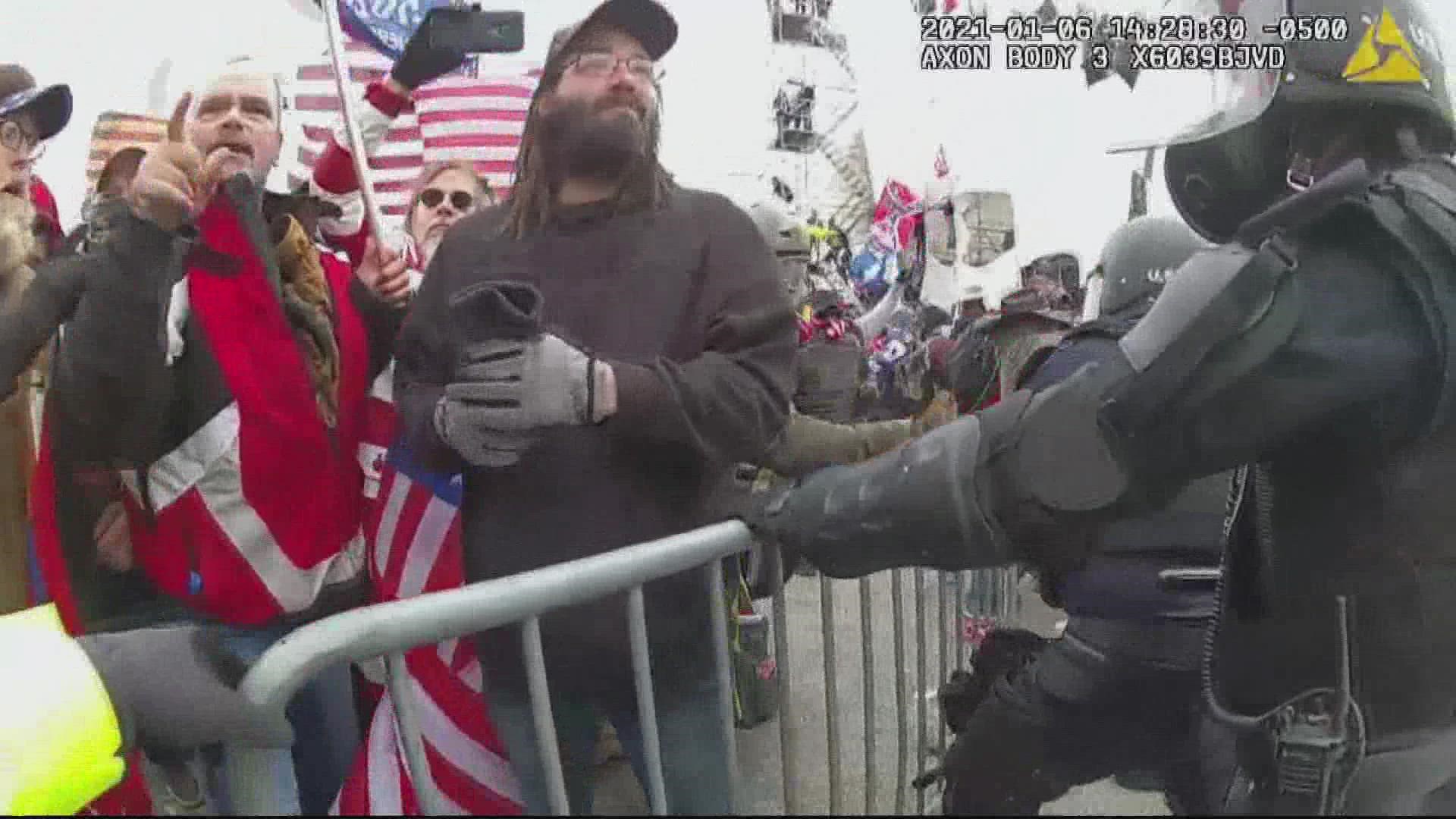WASHINGTON — A federal judge said Tuesday he is still “very seriously contemplating” the government’s request to reconsider his position on the obstruction charge hundreds of Capitol riot defendants are facing.
To date, U.S. District Judge Carl Nichols is the only judge on the D.C. District Court to dismiss charges of obstructing an official proceeding against any of the more than 700 defendants now charged in the riot. In a March order dismissing the count against Garrett Miller, of Texas, Nichols relied on a narrow reading of the statute — 18 USC § 1512(c)(2) — that would require a defendant to be accused of taking “some action with respect to a document, record or other object” in order to corruptly obstruct the joint session of Congress on Jan. 6. Nichols stuck to that reading in February when he dismissed the same obstruction charge in the case against another defendant, Pennsylvania police officer Joseph W. Fischer.
None of Nichols’ colleagues on the court have adopted his reading of the law, which was passed as part of a series of post-Enron reforms in 2002. Since his ruling, however, dozens of defendants in other Capitol riot cases have cited Nichols’ decision in motions asking to have the obstruction charges against them thrown out.
At least one of Nichols’ colleagues, U.S. District Judge John Bates, has written an opinion saying he thought Nichols’ interpretation was wrong. And last month, federal prosecutors filed a motion asking Nichols to reconsider his ruling. They argue Nichols incorrectly applied the rule of lenity – a legal principle requiring judges to rule on any ambiguities in the law in a defendant’s favor – because no other judges on the court have found the law unclear. They also say Nichols' reading of the word "otherwise" in the statute doesn't agree with any other judges on the D.C. District.
Fischer’s attorneys, who joined him in court Tuesday for a motion hearing, have urged Nichols not to reconsider his ruling. They argued in a response motion last month that nothing has changed to warrant reconsideration.
“There is certainly no contention that there has been an intervening change in the law – in fact, it is a penumbra of uncertainty that surrounded § 1512(c)(2)’s scope that invited the numerous legal challenges to its use in the January 6 prosecutions,” Fischer’s attorneys wrote.
In court Tuesday, though, Nichols said he didn’t want to hear additional arguments on reconsideration at that time – noting he was “still very seriously contemplating it.” Judges routinely agree to reconsider issues like bond and pretrial release conditions – even if they don’t ultimately reverse their positions – but granting a motion to reconsider a question of law as significant as the one in the Miller and Fischer cases would be far more unusual, and could have wide-ranging ramifications for outstanding motions in dozens of other Capitol riot cases.
Nichols did not rule on the motion Tuesday, instead focusing on several other motions before him, including similar requests from both Fischer and a second defendant, Jeffrey McKellop, for a change of venue.
McKellop, a Special Forces veteran accused of throwing a flagpole like a spear at police on Jan. 6, asked Nichols to move his case to the Western District of Virginia, where he lived until his arrest. His attorney, John Kiyonaga, argued in court that potential jurors in D.C. have been too personally affected by the Capitol riot and the months of National Guard presence that followed to rule impartially. Kiyonaga also pointed to intense media coverage of the case, which he argued further biased potential jurors.
One of Fischer’s attorneys, Amanda Gaynor, presented Nichols with similar arguments along with a survey the Federal Public Defender’s Office commissioned which found a high percentage of potential jurors in D.C. had exposure to Jan. 6 itself or media coverage of the event.
“I think the baked-in prejudices we identified in the survey are only going to get worse,” Gaynor said.
Nichols appeared unconvinced, however, and said as much — telling the attorneys it was his “strong inclination” to hold the change-of-venue motions until trial, at which point he could determine if potential jurors were unreasonably biased during voir dire. Nichols also pointed out that four jury trials had already successfully been held in D.C. for Capitol riot defendants, most recently former NYPD officer Thomas Webster, who was convicted of six counts on Monday.
“It seems to me the implication of your argument is that every single one of these Jan. 6 cases should be transferred venues… that D.C. is the only place none of these trials should occur,” Nichols said.
“It is,” Gaynor conceded.
After saying he would hold the venue motions and other requests to limit character evidence for now, Nichols denied a motion from Fischer to dismiss additional counts against him. He also denied a motion to dismiss the indictment against McKellop, who argued he was being selectively prosecuted because charges had been dropped in some cases connected to protests in Portland in 2020. Nichols said there were “obvious differences” between the two situations.
Finally, Nichols said he would issue a written order at a future date on the government’s request to prevent McKellop from presenting a self-defense theory at trial. McKellop hadn’t yet indicated in court filings whether he intended to pursue self-defense as an affirmative defense in his case, and his attorney, Kiyonaga, said he didn’t believe they were obligated to inform the government of their decision on that either way. Webster, the former NYPD officer convicted Monday, unsuccessfully argued self-defense in his case.
We're tracking all of the arrests, charges and investigations into the January 6 assault on the Capitol. Sign up for our Capitol Breach Newsletter here so that you never miss an update.

